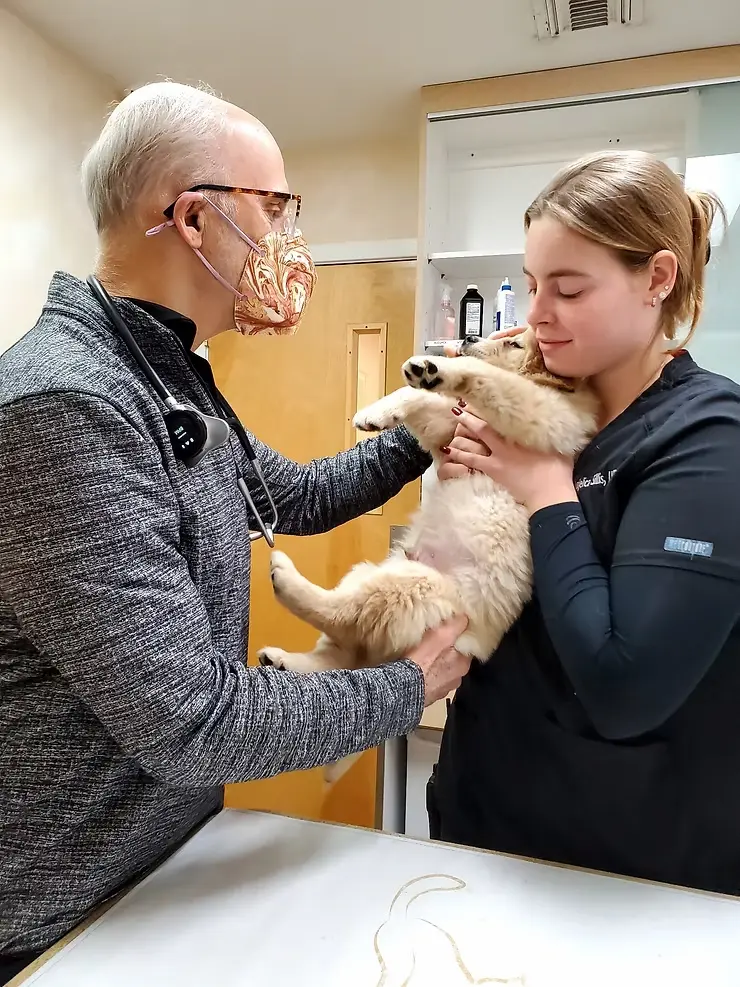I. Introduction
Adopting a Golden Retriever puppy into your family is a decision that will be met with a good deal of joy and responsibility. Friendly disposition, intelligence, and loyalty are traits commonly associated with Golden Retrievers, and these adorable dogs have earned their spot as one of the world’s favorite dog breeds. But welcoming a new, four-legged addition to your family starts far before your new pooch ever comes home. One of your greatest assets in this process will be finding a quality breeder. Buying a puppy from a reputable breeder guarantees you have a healthy, well-adjusted dog while encouraging ethical breeding practices that put the quality and health of the breed first. Sadly, the growth of puppy mills and backyard breeders has made it even more crucial for potential dog owners to grasp the importance of selecting a breeder who follows high standards of care and ethical treatment. Read this article to find out everything you need to know about choosing a responsible breeder, health and genetic factors to consider when choosing a Golden Retriever puppy, the effects of early socialization, and more regarding the pros of getting a puppy through a reliable source. Through informed choice, you can pave the way for a beautiful companionship with your new dog.
II. Understanding Reputable Breeders
When you plan to get a Golden Retriever puppy, you just cannot pick anyone. A good breeder is a crucial component in making sure that your future pet is healthy, well-socialized, and is a good fit for you and the way you live. The first step in making an educated decision is to know what is considered a responsible breeder.
A. What is a Reputable Breeder?
A responsible breeder will always emphasize the health and welfare of their dogs. The breeder of this sort is an enthusiast willing to improve the breed and responsible for all rules of breeding. They know the breed’s standards and they do their best to breed dogs that meet those standards. Ethical breeders generally belong to breed clubs whose guidelines include testing and responsible breeding. They are not part of the pet overpopulation problem, and they are selective about where their puppies are placed – the puppy and the prospective Owner are expected to be well matched!
B. Qualities to Look for in a Breeder
The best breeders have several qualities that make them distinguishable from the not-so-good ones. They are usually open about their breeding practices and willing to tell you what health history a puppy or its parents has. They also keep a clean, nurturing environment for the dogs so all dogs are well taken care of, the breeding dogs and puppies. A good breeder also loves the breed and is up to date on the latest health and behavior information. Additionally, responsible breeders will also interview prospective puppy owners, grilling to ensure that they can give their pups everything they need. They ought to have references from their previous puppy buyers and may have you sign a contract detailing their obligations as well as yours.
C. Questions for a Breeder
Here are some things that you need to ask potential breeders to be sure they’re in it for the right reasons and that they are what you are looking for. Here are some things to think about:
What testing do you do for health issues in your breeding dogs?
A reputable breeder will put health clearances on the parents of the puppy, such as for hips and heart conditions, among others.
May I meet the puppy’s parents?
Meeting the puppy’s parents could offer important clues about the disposition and health of the line.
What is the socialization and rearing style you use?
Getting information about how the breeder has socialized their puppies can provide insight as to how well-adjusted the puppy may be to other situations.
What kind of customer support do you offer post-sales?
A good breeder may be able to offer help, ongoing advice, and even a kind of return policy if owners can no longer keep the puppy.
Do you have any references from a previous buyer?
Speaking with other people who have purchased puppies from the breeder will assist you in determining their reputation as well as the quality of the dogs.
By asking these types of questions and finding a breeder who lives up to these key features, choosing a Golden Retriever puppy for your family can be a much more assured decision. A good reputable breeder should help make it easy for you to get a healthy puppy and keep that relationship long and healthy for your puppy’s lifetime.
III. Health and Genetic Considerations
When you bring a Golden Retriever puppy home, it’s very important to pay close attention to health and genetic issues. Buying from a responsible breeder is more important than you might think because said breeders behind your puppy care for your new friend’s health and well-being, and will influence your family’s overall health. In this part, you’ll learn all about the vital role health testing plays, you’ll learn about some genetic conditions that are widely known for affecting Goldens, and we also cover what you can expect from health guarantees from the right breeder.
A. Value of the Health Test
Health testing is a vital part of being able to guarantee that the Golden Retriever puppies you are raising are free of any genetic disease that may shorten their life or cause issues later in life. Responsible breeders seek and maintain the best of health for their dogs and do a number of tests looking for hereditary disease common in the breed. These tests generally check for hip dysplasia, elbow dysplasia, heart disease, and eye issue, and more. Breeders are then able to use these tests and help decide which dogs should breed to minimize the possible transmission of genetic problems to the puppies produced. And health testing gives a bit of reassurance to people who are purchasing a puppy, knowing that their new best friend is less likely to have terrible health issues. And this proactive attitude doesn’t just have the benefit of working against irresponsible breeding but in the overall betterment of the breed.
B. Genetic Disorders in Golden Retriever: General perception and occurrence.
Golden Retrievers are known for growing up to be friendly dogs, not to mention incredibly smart too, but like a lot of dog breeds out there, they can be prone to a select group of genetic health issues. The most frequent health problems with this breed are hip dysplasia, elbow dysplasia, heart disease, and eye disease (cataracts, progressive retinal atrophy (PRA)).
– Hip Dysplasia:
Living with this disease is very painful for your dog, let alone with medicinal products this can be very expensive. Health testing for both of these conditions can help catch them early and allow them to be managed effectively.
– Elbow Dysplasia:
Like hip dysplasia, elbow dysplasia affects that joint that can result in pain and restricted movement. Ethical breeders test for this condition in order to prevent it from being passed down to their puppies.
– Heart Disease:
Heart disease can affect Golden Retrievers and cause conditions such as Dilated Cardiomyopathy (DCM). Regular veterinary visits and early detection can help reduce this risk.
– Eye Disease:
Conditions such as cataracts and PRA can cause vision problems. Breeders that test for eye health can also assist in making sure that puppies will be at lower risk of developing these conditions.
Knowledge of these genetic conditions highlights the importance of comprehensive health testing and responsible breeding.
C. Advantages of Health Warranties
There are many benefits of buying a pup from a responsible breeder, and a health guarantee is a very important one! A health guarantee is a contract where the seller assures that the puppy will not be plagued with certain breed-related health conditions, within a certain time frame after purchase. This commitment demonstrates the breeder’s dedication to their puppies’ overall quality of life and provides new owners with the peace of mind they deserve. If a genetic disease is found during the guarantee period, reputable breeders will usually offer you your choice of another puppy or a reimbursement of your vet bills. This does not just relieve the pet owners of a financial burden, but also it speaks volumes of how confident the breeder is in the healthiness of the puppies.
In summary: If you want to get the most bang for your buck in the realm of optimal health, and be certain to stack the odds in your favor to increase your chances of making more healthy, happy memories (as opposed to heartache and money loss) when searching for a Golden Retriever puppy – look to health and genetics first! Knowing the value of health testing, being educated on genetic defect occurrences, and receiving health guarantees are beyond value and things that should be enjoyed by the puppy and the new owner. When you select a quality breeder, you invest in the long-term health and happiness of your new family member and set the foundation for a rewarding partnership.
IV. Socialization and Early Development
A. Socialization in the Life of Puppies
Socialization is an extremely important part of a puppy’s development and is pivotal in shaping a dog’s temperament and character. Socialization is extremely important for Golden Retrievers, who are often friendly and sociable in nature. This means new puppies should be introduced to as many people, places, and things as possible at their age, normally anywhere from 3-16 weeks. The end result is that puppies that are properly socialized are also better able to become well-adjusted adults and they will not have the tendency to fear or react based on fear in new situations. Responsible breeders will recognize the importance of this critical stage and take great pains to socialize their puppies, so that they can grow up relaxed and flexible, no matter what environment they find themselves.
B. Influence of Breeder on Behavior
As the parents, you are the one who can best influence Golden Retriever puppy behavior. Just like for the physical health of the puppies, a responsible breeder cares for the puppies’ emotional and psychological health as well. This includes creating a loving space for puppies to socialize with their littermates, humans, and other pets. These sorts of encounters will eventually reinforce good behavior and reduce the risk of behavioral problems in the future. An experienced breeder will be on the lookout for any potential temperament problems from the start and work on raising puppies who are healthy and bear the breed’s friendly, trusting nature.
C. Significance of Early Environment Exposure
Yet another critical period of your puppy’s development is early exposure to various environments. A responsible breeder knows that puppies need to be exposed to different sounds, sights, and stimuli outside the home environment. For our ball of fur, that can include trips in the park, where he sees differing types of flooring, hears interesting noises from household appliances, and even meets people from young to old. This provides pups with the necessary exposure for learning how to interact and relate to the world around them which is conducive to helping them learn how to appropriately react to new stimuli. Reputable breeders also set their puppies up for a lifetime of socialization by raising their puppies in a variety of levels of chaos and craziness so that by the time they head off to new homes, the new owner is getting an adaptable, “can roll with the punches” puppy.

Learn more:
https://www.akc.org/dog-breeds/golden-retriever/
Quote:
“Golden Retrievers are not bred to be guard dogs, and considering the size of their hearts and their irrepressible joy and life, they are less likely to bite than to bark, less likely to bark than to lick a hand in greeting. In spite of their size, they think they are lap dogs, and in spite of being dogs, they think they’re also human, and nearly every human they meet is judged to have the potential to be a boon companion who might at any moment, cry, ‘Let’s go!’ and lead them on a great adventure.” – Dean Koontz













